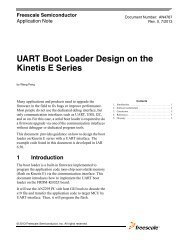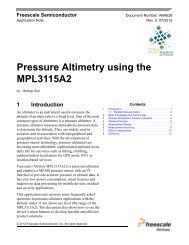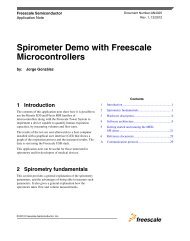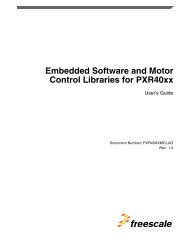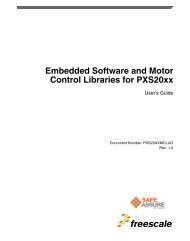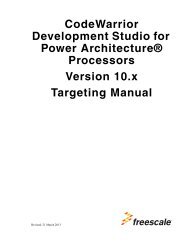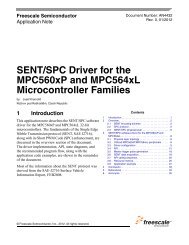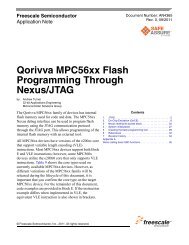SMBus Quick Start Guide - Freescale Semiconductor
SMBus Quick Start Guide - Freescale Semiconductor
SMBus Quick Start Guide - Freescale Semiconductor
Create successful ePaper yourself
Turn your PDF publications into a flip-book with our unique Google optimized e-Paper software.
Where <strong>SMBus</strong> is used<br />
10<br />
<br />
<br />
<br />
<br />
<br />
<br />
<br />
<br />
8 Where <strong>SMBus</strong> is used<br />
<br />
<br />
<br />
<br />
<br />
<br />
<br />
<br />
<br />
<br />
<br />
<br />
<br />
<br />
<br />
<br />
Figure 13. Block read protocol<br />
<br />
<br />
<br />
<br />
<br />
<br />
Figure 14. Block write protocol<br />
The Smart Battery System (SBS) is the system that uses <strong>SMBus</strong> technology. An SBS system usually<br />
consists of a Host, a Smart Charger, and a Smart Battery. It is the easiest and most efficient way to<br />
implement a battery management system for portable electronic devices such as laptop computers, cellular<br />
phones, video cameras, and so on.<br />
The SBS design uses <strong>SMBus</strong> technology; therefore, the Smart Battery and Smart Charger can<br />
communicate with each other and with the rest of the system. In the SBS, the battery can tell the charger<br />
its battery chemistry type, its capacity, how it wants to be charged, its optimal charging current, maximum<br />
charging time, and so on. The battery, if it is smart, can be operated optimally. It doesn’t have to be<br />
recharged as frequently as those using systems that only “guess” how much power is available. This<br />
benefits the end user by providing longer battery life and accurate battery energy capacity information<br />
down to the last 1%.<br />
In fact, an SBS-compliant design can increase battery cycle life up to 30%. In addition, users are not tied<br />
to one type of battery technology; different types of battery chemistries can be used interchangeably. Smart<br />
Chargers can choose the battery chemistry they support, and use the correct charging profile for that<br />
chemistry. This reduces potential damage and avoids risk that may be caused by an non-smart charger.<br />
<br />
<br />
<br />
<br />
<br />
<br />
<br />
<br />
<br />
<strong>SMBus</strong> <strong>Quick</strong> <strong>Start</strong> <strong>Guide</strong>, Rev. 1<br />
<br />
<br />
<br />
<br />
<br />
<br />
<br />
<br />
<br />
<br />
<br />
<br />
<br />
<br />
<br />
<br />
<br />
<br />
<br />
<br />
<br />
<br />
<br />
<br />
<br />
<br />
<br />
<br />
<br />
<br />
<br />
<strong>Freescale</strong> <strong>Semiconductor</strong>


